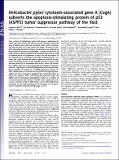Helicobacter pylori cytotoxin-associated gene A (CagA) subverts the apoptosis-stimulating protein of p53 (ASPP2) tumor suppressor pathway of the host
Author(s)
Buti, Ludovico; Spooner, Eric; Van der Veen, Annemarthe G.; Rappuoli, Rino; Covacci, Antonello; Ploegh, Hidde; ... Show more Show less
DownloadButi-2011-May-Helicobacter pylori.pdf (780.1Kb)
PUBLISHER_POLICY
Publisher Policy
Article is made available in accordance with the publisher's policy and may be subject to US copyright law. Please refer to the publisher's site for terms of use.
Terms of use
Metadata
Show full item recordAbstract
Type I strains of Helicobacter pylori (Hp) possess a pathogenicity island, cag, that encodes the effector protein cytotoxin-associated gene A (CagA) and a type four secretion system. After translocation into the host cell, CagA affects cell shape, increases cell motility, abrogates junctional activity, and promotes an epithelial to mesenchymal transition-like phenotype. Transgenic expression of CagA enhances gastrointestinal and intestinal carcinomas as well as myeloid and B-cell lymphomas in mice, but the mechanism of the induced cancer formation is not fully understood. Here, we show that CagA subverts the tumor suppressor function of apoptosis-stimulating protein of p53 (ASPP2). Delivery of CagA inside the host results in its association with ASPP2. After this interaction, ASPP2 recruits its natural target p53 and inhibits its apoptotic function. CagA leads to enhanced degradation of p53 and thereby, down-regulates its activity in an ASPP2-dependent manner. Finally, Hp-infected cells treated with the p53-activating drug Doxorubicin are more resistant to apoptosis than uninfected cells, an effect that requires ASPP2. The interaction between CagA and ASPP2 and the consequent degradation of p53 are examples of a bacterial protein that subverts the p53 tumor suppressor pathway in a manner similar to DNA tumor viruses. This finding may contribute to the understanding of the increased risk of gastric cancer in patients infected with Hp CagA+ strains.
Date issued
2011-05Department
Massachusetts Institute of Technology. Department of BiologyJournal
Proceedings of the National Academy of Sciences of the United States of America
Publisher
National Academy of Sciences
Citation
Buti, L. et al. “Helicobacter Pylori Cytotoxin-associated Gene A (CagA) Subverts the Apoptosis-stimulating Protein of P53 (ASPP2) Tumor Suppressor Pathway of the Host.” Proceedings of the National Academy of Sciences 108.22 (2011) : 9238-9243. ©2011 by the National Academy of Sciences
Version: Final published version
ISSN
0027-8424
1091-6490